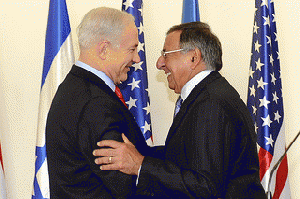A march organized by the French government to protest against the terrorist attacks that took place in Paris this week drew over a million people according to the Ministry of the Interior, while a total of over three million marched across France, and similar marches were held around the world. Now that the drama has played itself out for tv, the questions it raises must be addressed.[tag]
First of all, the extraordinary participation in this charade shows that governments can diffuse citizens' resistance to increased surveillance of their e-mails and phone calls by encouraging them to demonstrate their support for free speech and expression by journalists. The implication is that if you don't want the free speech of journalists to be targeted by terrorists, you must allow the govern-ment to surveil your speech. (Interestingly, while the contradiction this implies in the Western world is swept under a rug of emotion, it has afforded journalists in the Arab world, such as Egypt, the opportunity to demand freedom of the press, according to images on France 24.)
Secondly, it was logical for the other leaders of Europe to be in the front line of the march together with French President Francois Hollande, because the events of this week are part of a Europe-wide problem. But why was Israel's Prime Minister Benjamin Netanyahu also there? As I wrote in my previous piece, France has a small but very influential Jewish community, tightly linked to Israel, as does the United States. Yesterday, one of the Sunday talk shows featured a Jerusalem banner stating 'Israel is Charlie', and nothing could illustrate more eloquently the fact that Europe's - and especially France's - Arab problem' is also a 'Jewish' problem.
The problem is no longer, as it was for centuries, that of Christian Europe rejecting so-called long-nosed outsiders accused of murdering Christ. In broad brush strokes, it is about Europe's balancing act between Israel, to which hundreds of thousands of French Holocaust survivors fled for safety, and the oil located in the ground of Israel's neighbor, Saudi Arabia, which France needs. Not to mention two centuries of direct involvement in the Arab world, starting with Napoleon's incursion into Egypt and the colonization of Algeria in 1830, that lasted until 1962. The French should not be surprised that the special relationships Paris maintains with former colonies, ensuring that they evolve within a French sphere of influence (not much different from Russia's 'near abroad' policies, except that France is separated from Africa by a sizable sea), should influence the thoughts and feelings of the Muslim population in what used to be called 'la metropole' to distinguish between mainland France and Algeria, when the latter was considered part of France.
Discussions of 'the Muslim' problem this week have focused on the thousands of young Europeans who travel to Iraq, Syria and Yemen to join Al Qaeda or ISIS, returning to commit acts of terrorism in their countries of origin. (I do not use the term 'homelands' because it is clear that these people now consider the Arab world as their homeland.) News references to the foreign policies of France or other European countries, most of which are members of NATO, are few, far between and brief. However those countries should not be surprised that their contributions to the US-led war on terror boomerangs, as journalists covering yesterday's events admitted. And yet, the question of Israeli policy toward Palestinians, went largely unmentioned, notwithstanding - or perhaps because of - the prominent presence of Benjamin Netanyahu. The Israeli Prime Minister never hides his attitude toward Palestinians in particular and Arabs in general, and his presence at the march will not have been lost on france' s Muslims. Jake Tapper on CNN mentioned that it was a mistake for Washington not to send a high-ranking official to the march (Eric Holder was in Paris only for consultations), but that it might have been a way to show (pretend) that DC doesn't run Europe. I would add that Israel represents US interests in the Middle East, and although it was actually asked not to attend, its highly publicized participation in the Paris commemoration marked its official entry into Europe, not in the same category as its neighbor Turkey (if it were to be accepted), but as a member of the club of white rulers of the world confronted with a developing world still mired in poverty.
The Paris attack illustrates the bubbling up of a full-fledged crisis between Europe and the Islamic part of that develop-ing world, whose populations account for more than a fifth of the global total. It has been reduced, for the popular imagination and tv ratings, to a fight against terrorism, which Israel will exploit to the hilt to justify a Palestinian policy that goes a long way toward maintaining that crisis. If this sounds like an exaggeration, four Jews were killed at a Kosher supermarket, and of the twelve people killed at Charlie Hebdo, only two or three are identified as Jewish; two were Arabs, as was a policeman shot at the scene. Why then did the march, led by the head of a resolutely secular state and forty world leaders, end at the Grand Synagogue, with Israel's Prime Minister as the featured speaker?






